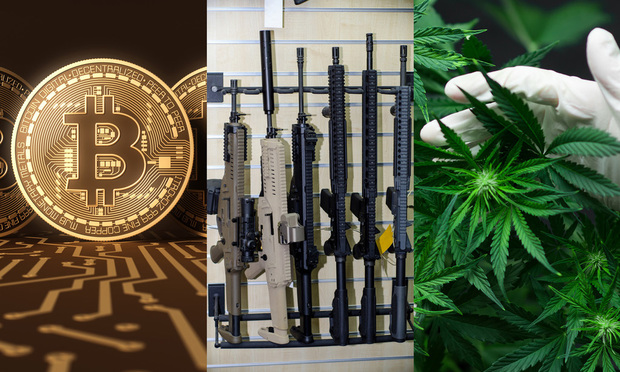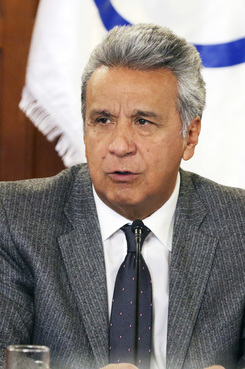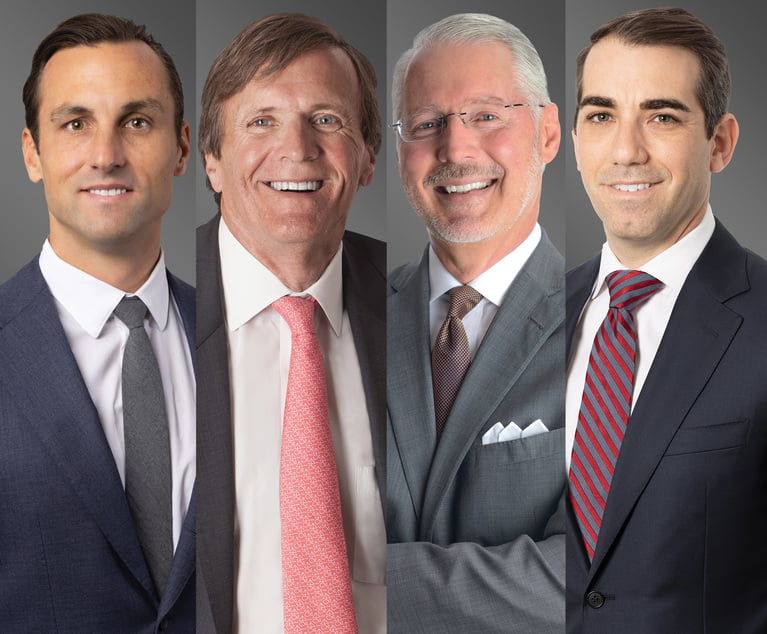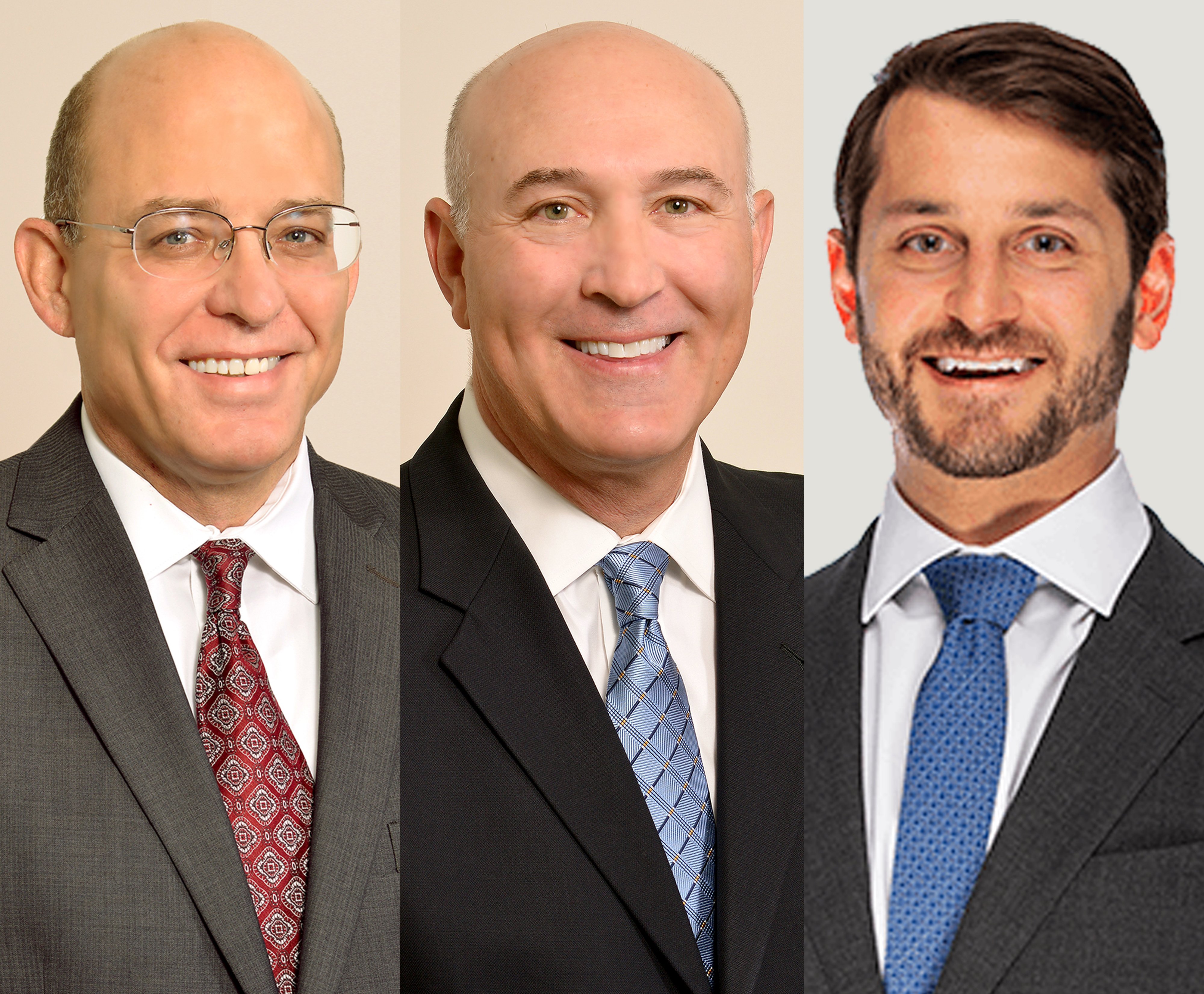8 Florida Cases to Watch in 2019
At the top of 2019, which Florida cases have lawyers checking dockets with bated breath? Here's a look at eight cases that have gripped local litigators. Where…
January 09, 2019 at 03:19 PM
6 minute read
 Bitcoin, guns, cannabis. Photo: royalty free.
Bitcoin, guns, cannabis. Photo: royalty free.
At the top of 2019, which Florida cases have lawyers checking dockets with bated breath? Here's a look at eight cases that have gripped local litigators.
Where can a Florida-based company sue its out-of-state employees?
Miami business litigator Eric Ostroff, partner at Meland Russin & Budwick, has his eye on Citrix Systems Inc. v. Matthew Ware et al. Chief Broward Circuit Judge Jack Tuter will soon hold a hearing on the case, which tackles the question of personal jurisdiction when it comes to remote employees.
In 2017, Fort Lauderdale-based tech company Citrix Systems Inc. sued seven former employees who worked from North Carolina when they left to work for a competitor. The suit accused the staff of misappropriating trade secrets and breaching a contract that included a covenant not to compete. But the employees argue Florida doesn't have jurisdiction over them.
Do foreign governments take precedence over state courts?
 President Lenin Moreno discussing climate and geographical issues of Ecuador at a cabinet meeting in December 2017. Photo: Agencia de Noticias Andes/ Wikimedia Commons.
President Lenin Moreno discussing climate and geographical issues of Ecuador at a cabinet meeting in December 2017. Photo: Agencia de Noticias Andes/ Wikimedia Commons.Former Florida Supreme Court Justice Raoul Cantero is among a group of Miami lawyers challenging a Third DCA ruling they say could result in Florida courts having to submit to totalitarian regimes.
The Ecuadorean government sued two brothers in Miami for allegedly embezzling about $662 million from Filanbanco, the bank where they were administrators. The suit — Republic of Ecuador v. Roberto Isaias Dassum and William Isaias Dassum — was initially dismissed for lack of standing and expired statute of limitations, but the appeals court reversed the move.
International litigator Arnoldo B. Lacayo of Sequor Law, Miami, said the case is a crucial one for international practitioners, as it asks whether acts in another sovereign state are valid in Florida's courts.
Could this case reveal Bitcoin creator's identity?
 Bitcoin cryptocurrency. Photo: REDPIXEL.PL/Shutterstock.com.
Bitcoin cryptocurrency. Photo: REDPIXEL.PL/Shutterstock.com.Dave Kleiman v. Craig Wright, an $11.4 billion bitcoin trial will play out in Miami federal court in September, is almost certain to raise eyebrows. Kleiman's suit accuses his Australian former business partner of committing forgery and filing false documents to take control of bitcoin. Wright has claimed to be Satoshi Nakamoto, mysterious creator of the cryptocurrency, but that claim has never been verified.
Complex litigator Daniel Maland at Kozyak, Tropin and Throckmorton is watching closely and says bitcoin transaction logs indicate that Nakamoto is one of the richest people in the world.
According to Alan Rosenberg with Markowitz Ringel Trusty + Hartog, the vast size and scope of the case could serve as a roadmap for future cryptocurrency litigation.
Related story: Who Is Satoshi Nakamoto and Could a South Florida Case Unmask the Enigmatic Bitcoin Creator?
Will a key ADA ruling be overturned?
Juan Carlos Gil v. Winn Dixie, an Americans with Disabilities Act lawsuit pending in the Eleventh Circuit Court of Appeals, could unravel or affirm a landmark 2017 ruling that found a supermarket's website violated blind internet users' rights and laid the groundwork for an influx of website-accessibility lawsuits.
The court will consider Winn-Dixie's appeal that websites are not places of public accommodation and that the supermarket is in compliance with the ADA. Commercial litigators Michael Landen of Kluger Kaplan and Jason Kellogg, partner at Levine Kellogg Lehman Schneider & Grossman, said many of their clients in the business world are waiting in suspense.
Can school shooting victims sue rifle makers?
The family of a victim of the Parkland shooting at Marjory Stoneman Douglas High School on Valentine's Day in 2017 has sued Smith and Wesson, makers of the AR-15 semi-automatic rifle used in the attack. Miami firm Podhurst Orseck represents the plaintiff.
The court heard the defense's motion to dismiss Jamie Guttenberg et al v. Smith and Wesson in December, and is expected to rule in a few weeks.
Has a Miami church breached its lease?
The Miami-Dade Property Appraiser has claimed Brickell's First Presbyterian Church of Miami is violating its religious exemption status by leasing some of its grounds to a for-profit school and food trucks.
The case could have wide implications for developers and religious institutions, according to Franklin Zemel, a partner at Saul Ewing Arnstein & Lehr, who represents dozens of churches, synagogues and mosques around the country.
The Church claims it's not leasing but merely “outsourcing” the administration of its school.
“Why is the characterization so important? Because in order to qualify for the tax exemption, there must be unity between the owner of the property and the user of the property,” Zemel said.
Will Florida courts embrace cannabis?
 Hemp. Photo: Lifestyle discover/Shutterstock.com.
Hemp. Photo: Lifestyle discover/Shutterstock.com.According to Kathi Giddings, deputy chair of Akerman's Litigation Practice Group, cannabis is set to be a hot topic this year. Several appeals are pending in the First District Court of Appeal concerning the 2016 general election, in which Floridians voted to broaden the use of medical marijuana.
The legislature has restricted who can cultivate, process, sell and smoke medical marijuana, but the lawsuits argue otherwise. Akerman represents medical marijuana center Florigrown in one of those cases, and recently obtained an injunction against the Department of Health.
Will Florida courts side with EB-5 Investors alleging fraud?
A group of 78 Chinese investors sued Nicholas Mastroianni II, a high-profile EB-5 investment broker with ties to former Trump lawyer Michael Cohen. In a Palm Beach Court filing, the plaintiffs claimed Mastroianni cheated them out of almost $100 million in a real estate venture, but Mastroianni has rejected the suit as a “sham.”
Jeffrey Schneider, managing partner at Levine Kellogg Lehman Schneider + Grossman, who filed the suit, said the case could send a strong message to the EB-5 industry about promises made to investors.
“This case is important at a time when developers have completed their projects and are now expected to return the EB-5 money back that they 'borrowed' from the EB-5 investors,” Schneider said.
It's hard to say which way the courts will rule, so observers must stay tuned for updates on these cases throughout the year.
Related stories:
In Telecommuting Age, Court Weighs Question of Jurisdiction Over Remote Employees
Attorneys Fear Ruling Exposes Florida to Baseless International Decrees
$11.4 Billion Bitcoin Lawsuit Set for September in Miami Federal Court
This content has been archived. It is available through our partners, LexisNexis® and Bloomberg Law.
To view this content, please continue to their sites.
Not a Lexis Subscriber?
Subscribe Now
Not a Bloomberg Law Subscriber?
Subscribe Now
NOT FOR REPRINT
© 2025 ALM Global, LLC, All Rights Reserved. Request academic re-use from www.copyright.com. All other uses, submit a request to [email protected]. For more information visit Asset & Logo Licensing.
You Might Like
View All
2,000 Docket Entries: Complex South Florida Dispute Sets Precedent

Million-Dollar Verdict: Miami Jury Sides With Small Business


Miami-Dade Litigation Over $1.7 Million Brazilian Sugar Deal Faces Turning Point
3 minute readTrending Stories
- 1I’m A Lawyer, What Can I Sell?
- 2Internal GC Hires Rebounded in '24, but Companies Still Drawn to Outside Candidates
- 3How I Made Office Managing Partner: 'Don’t Be an Opportunity Killer,' Says Thomas Haskins of Barnes & Thornburg
- 4People in the News—Feb. 7, 2025—Gawthrop Greenwood, Lamb McErlane
- 5NY No-Fault Insurance Adopts Worker’s Compensation Fee Schedule
Who Got The Work
J. Brugh Lower of Gibbons has entered an appearance for industrial equipment supplier Devco Corporation in a pending trademark infringement lawsuit. The suit, accusing the defendant of selling knock-off Graco products, was filed Dec. 18 in New Jersey District Court by Rivkin Radler on behalf of Graco Inc. and Graco Minnesota. The case, assigned to U.S. District Judge Zahid N. Quraishi, is 3:24-cv-11294, Graco Inc. et al v. Devco Corporation.
Who Got The Work
Rebecca Maller-Stein and Kent A. Yalowitz of Arnold & Porter Kaye Scholer have entered their appearances for Hanaco Venture Capital and its executives, Lior Prosor and David Frankel, in a pending securities lawsuit. The action, filed on Dec. 24 in New York Southern District Court by Zell, Aron & Co. on behalf of Goldeneye Advisors, accuses the defendants of negligently and fraudulently managing the plaintiff's $1 million investment. The case, assigned to U.S. District Judge Vernon S. Broderick, is 1:24-cv-09918, Goldeneye Advisors, LLC v. Hanaco Venture Capital, Ltd. et al.
Who Got The Work
Attorneys from A&O Shearman has stepped in as defense counsel for Toronto-Dominion Bank and other defendants in a pending securities class action. The suit, filed Dec. 11 in New York Southern District Court by Bleichmar Fonti & Auld, accuses the defendants of concealing the bank's 'pervasive' deficiencies in regards to its compliance with the Bank Secrecy Act and the quality of its anti-money laundering controls. The case, assigned to U.S. District Judge Arun Subramanian, is 1:24-cv-09445, Gonzalez v. The Toronto-Dominion Bank et al.
Who Got The Work
Crown Castle International, a Pennsylvania company providing shared communications infrastructure, has turned to Luke D. Wolf of Gordon Rees Scully Mansukhani to fend off a pending breach-of-contract lawsuit. The court action, filed Nov. 25 in Michigan Eastern District Court by Hooper Hathaway PC on behalf of The Town Residences LLC, accuses Crown Castle of failing to transfer approximately $30,000 in utility payments from T-Mobile in breach of a roof-top lease and assignment agreement. The case, assigned to U.S. District Judge Susan K. Declercq, is 2:24-cv-13131, The Town Residences LLC v. T-Mobile US, Inc. et al.
Who Got The Work
Wilfred P. Coronato and Daniel M. Schwartz of McCarter & English have stepped in as defense counsel to Electrolux Home Products Inc. in a pending product liability lawsuit. The court action, filed Nov. 26 in New York Eastern District Court by Poulos Lopiccolo PC and Nagel Rice LLP on behalf of David Stern, alleges that the defendant's refrigerators’ drawers and shelving repeatedly break and fall apart within months after purchase. The case, assigned to U.S. District Judge Joan M. Azrack, is 2:24-cv-08204, Stern v. Electrolux Home Products, Inc.
Featured Firms
Law Offices of Gary Martin Hays & Associates, P.C.
(470) 294-1674
Law Offices of Mark E. Salomone
(857) 444-6468
Smith & Hassler
(713) 739-1250






